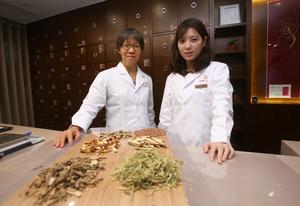 April
Tsai (left) and Mandy Choi, the Chinese
medicine practitioners of TDMall. PARKER ZHENG / CHINA DAILY
April
Tsai (left) and Mandy Choi, the Chinese
medicine practitioners of TDMall. PARKER ZHENG / CHINA DAILY
TDMall, a traditional Chinese medicine (TCM) clinic, has researched a prescription of herbs to strengthen people’s immunity in the hope that it could help fight the novel coronavirus pneumonia.
Founded in the city of Zhuhai, TDMall has recently opened its second clinic in Hong Kong. After COVID-2019 emerged in Wuhan in December, the clinic called upon several TCM experts and practitioners from the China Academy of Chinese Medical Sciences in Beijing with the hope of finding an antidote to the epidemic.
About 1,000 people in Zhuhai who have not been infected with the coronavirus have consumed the herbal tea free of charge, and they all feel well.
The Hong Kong clinic of TDMall opened in Causeway Bay earlier this month, with two TCM practitioners working there to assess the patients. More clinics soon will open in other parts of the city.
“The concept of TCM is to ‘consolidate the right, remove the evil’ and to strengthen the immunity of the people,” said Mandy Choi, a Hong Kong-based Chinese medicine practitioner for TCM. The prescription is available in the form of herbs for boiling, and also as granules because the company knows that Hong Kong people are often too busy to prepare herbal tea.
“Compared with SARS in 2003, the novel coronavirus is more contagious but it is not as deadly. For the deceased patients, it has been observed that elderly people with chronic diseases are more vulnerable to this new virus,” Choi said.
“Since they were found to be subject to a kind of ‘humidity’ in their bodies, the herbs that we use are ‘mild’ ones with the purpose of eliminating the kind of humidity from the people. A total of 15 Chinese herbs, such as honeysuckle, dried orange peels and licorice, can be used for treatment, but the Chinese medicine practitioner will choose a few herbs only, according to the health condition of the patient, climate as well as geographical conditions in Hong Kong.”
She added that if an autopsy is performed, it can be ascertained which organ of the deceased patient was attacked by the coronavirus and caused death.
April Tsai, who comes from Taiwan, is another practitioner working in the Hong Kong clinic. The two have engaged experts from the China Academy of Chinese Medical Sciences to go to Wuhan to understand the virus situation before they came up with a prescription in about a month.
“The herbs are not expensive and so they are offered to the patients for free, and we advise them to take two doses per day for three days,” she said. “The herbal tea prescription has not been consumed by confirmed patients because they are quarantined, but we hope they may have a chance to drink the herbal tea to see if it is really useful.”


